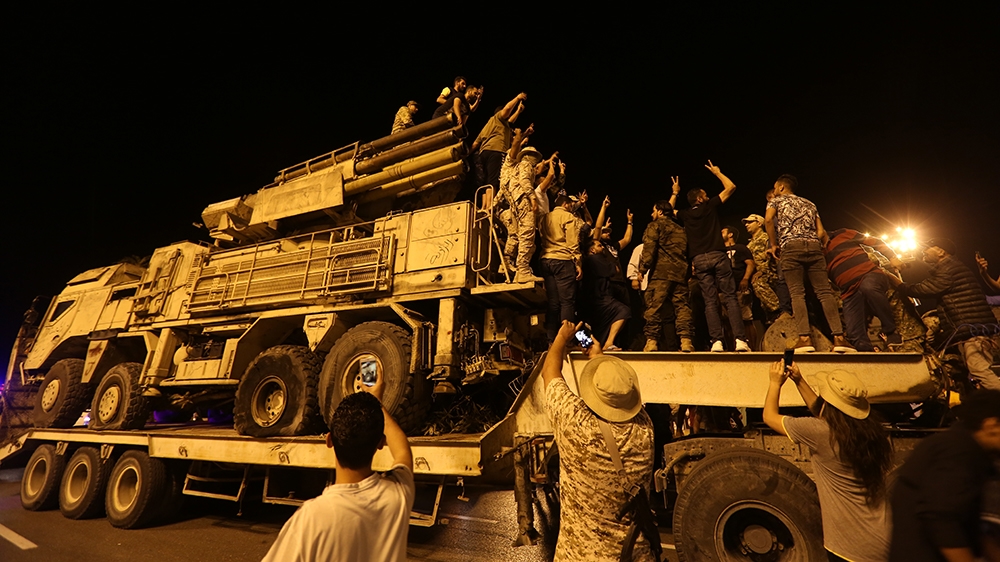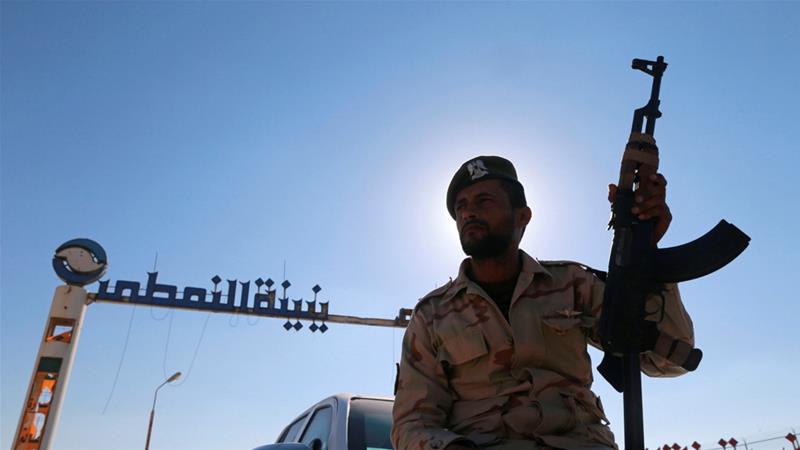Russian fighters flown out of western Libya after Haftar losses Analysts say departure a major setback for Haftar, depriving LNA of its most potent foreign fighting force near Tripoli.

People gather in Martyrs Square in Tripoli to inspect a Russian-made air defense system used by warlord Khalifa Haftar’s militias, captured by LNA. [Hazem Turkia/Anadolu]
Russian fighters in Libya were flown out to a town south of Tripoli by their eastern-based allies after retreating from front lines at the capital, Tripoli, according to a local official.
The reported departure of the Russians on Sunday was another blow to renegade eastern commander Khalifa Haftar’s self-styled Libyan National Army (LNA) and his foreign allies, who have been trying to take the capital for more than a year from the UN-recognised Government of National Accord (GNA).
More:
The Russian fighters allied to the LNA retreated with their heavy equipment from the capital to the airport of Bani Walid, a town some 150km (93 miles) southeast of Tripoli, said Salem Alaywan, Bani Walid’s mayor.
He told Reuters news agency the Russians were then flown out of western Libya to Jufra, a remote central district and LNA stronghold.
“They [the Russians] were flown in three military planes to Jufra, and their military vehicles were driven there,” he said.
1,200 mercenaries
LNA spokesman Ahmed Mismari denied any foreigners were fighting with his force.
But the presence of the Russian fighters has been widely documented by diplomats and journalists, and photographs purporting to show Russians in Bani Walid have been posted on social media.
According to a leaked United Nations report, Russian private military contractor Wagner Group deployed about 1,200 mercenaries to Libya to strengthen Haftar’s forces. They have been identified by their equipment, typically reserved for Russia’s armed forces.
UN monitors identified more than two dozen flights between Russia and eastern Libya from August 2018 to August 2019 by civilian aircraft “strongly linked to or owned by” Wagner Group or related companies.
Al Jazeera’s Mahmoud Abdelwahed, reporting from Tripoli, said Haftar’s immediate gains in the assault on Tripoli, which was launched in April 2019, have been attributed to the fighting prowess of these military contractors.
“We don’t know why they’re leaving at this crucial time, because Haftar is losing on the ground. The withdrawal of the Russian [fighters] could have major consequences for Haftar’s forces,” he said.
Haftar’s forces are backed by Russia, Egypt and the United Arab Emirates. The GNA is supported by Syrian fighters allied to Turkey, while Haftar is also using Sudanese fighters.

People gather in Martyrs Square in Tripoli to inspect a Russian-made air defense system used by warlord Khalifa Haftar’s militias, captured by LNA. [Hazem Turkia/Anadolu]
‘Meaningful event’
The GNA has, with Turkish help, made sudden strides in recent weeks, seizing a string of towns from the LNA, capturing the strategically important al-Watiya airbase, and destroying several Russian-made air defence systems.
“The withdrawal [of the Russians] from the greater Tripoli area is a very meaningful event because it deprives the LNA of its most effective, best-equipped foreign fighting forces on that key front,” said Jalel Harchaoui, research fellow at the Clingendael Institute.
Emad Badi, a senior fellow at the Atlantic Council with a research focus on Libya, agreed that the departure of the Russian mercenaries was a major setback for Haftar.
“Why they pulled out now is a subject of speculation, but you have to take into account that during the past week Turkey has really upgraded its aerial capabilities in Libya and has significantly weakened the strategic advantage that the Russian mercenaries provided.”
Badi said it was “obvious” that there was “some form of backdoor deal between Turkey and Libya in terms of allowing these mercenaries” to pull out.
He noted the move had major consequences for the battle of Tripoli.
“Since late August, it’s actually the Russian mercenaries that have enabled the ground offensive to not only continue but for Haftar’s troops to actually make territorial headway,” he added.
“As soon as they pulled out in roughly, I would say, eight hours, Haftar lost the territory that he’s gained in eight months – that’s how much of a strategic military advantage these Russian groups provided. That doesn’t mean that the war has ended but it does mean that in terms of capturing Tripoli, I don’t think it’s realistic to assume that that would be possible if the backers of Haftar do not significantly escalate against Turkey.”
The LNA still holds the town of Tarhouna south of Tripoli with the help of a local armed group.
In the past two days, LNA forces have withdrawn from some positions in southern Tripoli in what they described as a humanitarian gesture. Forces allied to the GNA re-entered some of those areas.
Libya has been without central government control for nine years, and since 2014 it has been divided between two main rival governments in the east and the west. The conflict has turned into a proxy war between the foreign allies of the two sides.

What’s happening with the war in Libya? | Start Here
SOURCE: AL JAZEERA AND NEWS AGENCIES

